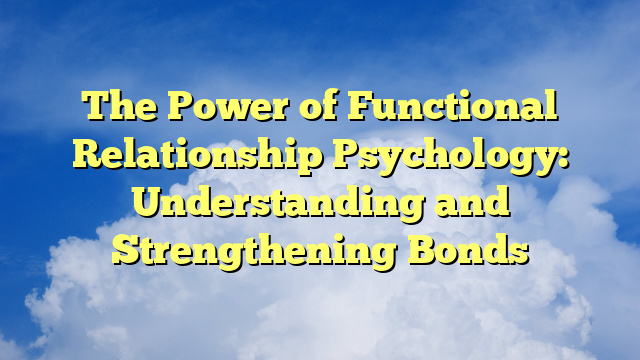The Power of Functional Relationship Psychology: Understanding and Strengthening Bonds
The Power of Functional Relationship Psychology: Understanding and Strengthening Bonds
Introduction
Relationships are an integral part of our lives, and understanding the dynamics that govern them can greatly enhance our ability to build and maintain strong bonds. Functional Relationship Psychology is a field that focuses on analyzing and improving the quality of relationships by examining the underlying psychological factors that influence them. By delving into the intricacies of human behavior and emotions, this approach offers valuable insights into how we can strengthen our connections with others.
The Importance of Understanding Relationship Psychology
Relationships can be complex and challenging, and often require effort and understanding to thrive. By studying relationship psychology, we gain a deeper understanding of the dynamics at play and can make informed decisions to improve our relationships. Functional Relationship Psychology provides a framework for understanding the underlying factors that contribute to relationship success, such as effective communication, emotional intelligence, and conflict resolution skills.
Building Strong Bonds
One of the key aspects of Functional Relationship Psychology is the emphasis on building strong bonds. This involves developing a deep sense of connection, trust, and intimacy with our partners. By understanding the psychological factors that contribute to bond formation, we can actively work towards strengthening our relationships.
Effective Communication
Effective communication is a cornerstone of any successful relationship. It involves not only expressing our thoughts and feelings clearly but also actively listening to our partners. Functional Relationship Psychology highlights the importance of open and honest communication, as it fosters understanding, empathy, and mutual respect. By practicing active listening and expressing ourselves authentically, we can create a safe and supportive environment for open dialogue.
Emotional Intelligence
Emotional intelligence refers to the ability to recognize, understand, and manage our own emotions, as well as the emotions of others. It plays a crucial role in building strong bonds, as it allows us to empathize with our partners and respond to their emotional needs effectively. Functional Relationship Psychology emphasizes the development of emotional intelligence through self-reflection, empathy training, and emotional regulation techniques.
Conflict Resolution
Conflict is inevitable in any relationship, but how we handle it can make a significant difference in the overall health of the bond. Functional Relationship Psychology provides strategies for resolving conflicts in a constructive and respectful manner. It encourages active problem-solving, compromise, and finding win-win solutions. By approaching conflicts with empathy and a willingness to understand each other’s perspectives, we can navigate disagreements without damaging the relationship.
Understanding Attachment Styles
Attachment theory is a fundamental concept in Functional Relationship Psychology. It explores how our early experiences with caregivers shape our attachment styles and influence our adult relationships. There are four main attachment styles: secure, anxious-preoccupied, dismissive-avoidant, and fearful-avoidant. Understanding our own attachment style and that of our partners can help us navigate relationship challenges and foster a secure and fulfilling bond.
The Role of Self-Awareness
Self-awareness is a crucial aspect of Functional Relationship Psychology. By developing a deep understanding of ourselves, our needs, and our triggers, we can approach relationships with clarity and intention. Self-awareness allows us to identify patterns, address unresolved issues, and make conscious choices that align with our values and goals. It also enables us to communicate our needs effectively and establish healthy boundaries.
Conclusion
Functional Relationship Psychology offers valuable insights into the dynamics of relationships and provides practical tools for strengthening bonds. By understanding the psychological factors that influence our connections with others, we can actively work towards building strong and fulfilling relationships. Effective communication, emotional intelligence, conflict resolution skills, understanding attachment styles, and cultivating self-awareness are all essential components of this approach. By incorporating these principles into our relationships, we can create a solid foundation for long-lasting and meaningful connections.

